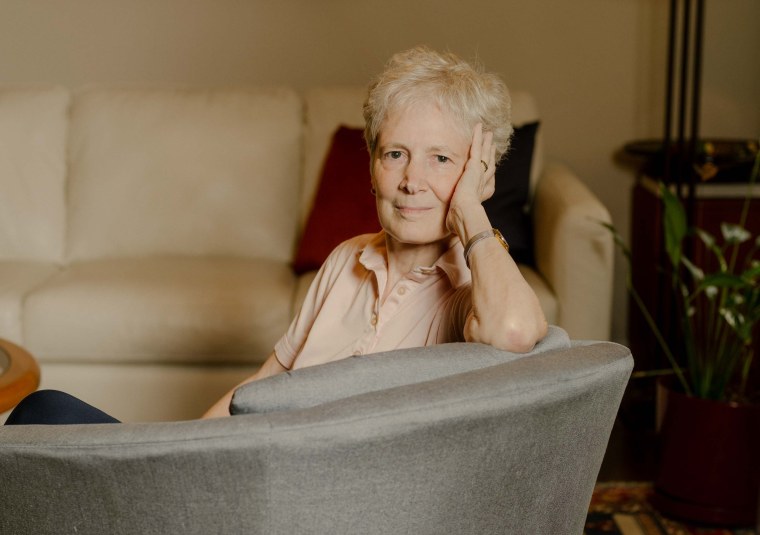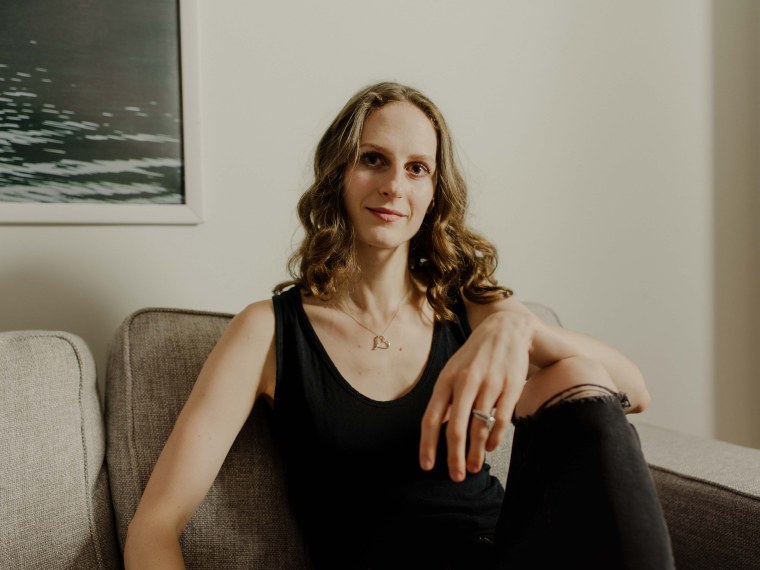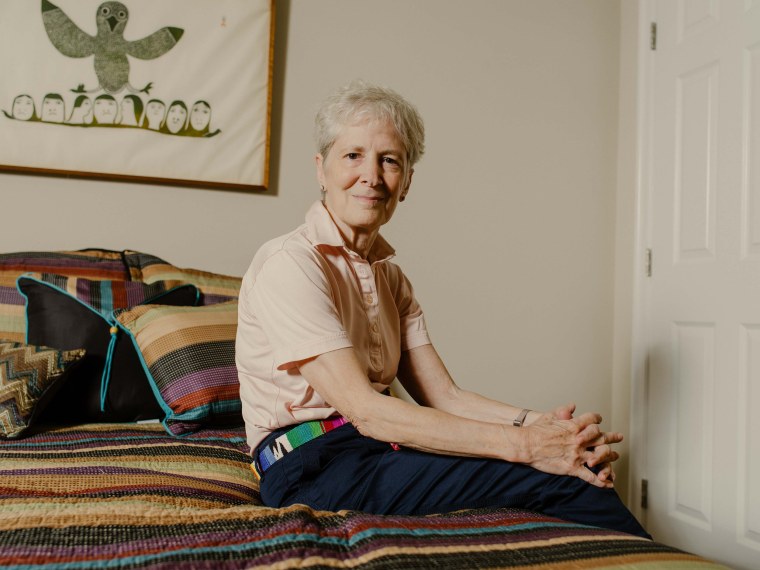It was a warm June afternoon when Judith Plaskow got the email reminding her of a guest arriving soon.
The woman staying at Plaskow's Washington Heights apartment was a stranger who needed to be picked up at the Port Authority bus terminal on Manhattan's West Side. She was young — just 19 — and had never been to New York City before. Plaskow guessed she'd be scared.
The woman wasn't coming to the big city for thrills or fun. There'd be no Broadway show, no visit to the Empire State building. She was making a 10-hour trip to receive safe, legal abortion care — because where she is from, it is not possible to get it.
"I just want to help women be able to make a determination about something that alters the course of their lives," Plaskow, 72, a retired university professor, told NBC News in a recent interview.
Plaskow is part of the Haven Coalition, an all-volunteer group of dozens of New York City women who offer shelter to women who travel from places where it is difficult, if not virtually impossible, to get a safe and legal abortion. As restrictions on abortion increase across the U.S. (at least nine states have passed restrictive abortion laws this year intended to provoke a Supreme Court showdown over Roe v. Wade), the places where it remains legal to receive safe care — and to receive such care later in a pregnancy — have emerged as hotspots for women desperate to be seen by a provider who will perform the procedure.
Thus, an increasing number of groups like Haven have emerged in recent years whose sole aim is to aid women who have no other option but to travel. Together with regional "abortion funds," another category of volunteer groups that communicates with clinics to cover the actual cost of care, they comprise a robust but quietly functioning network working to preserve abortion as a fundamental right, even for people who live where that right is increasingly being challenged.
Restrictions spur interest in volunteering
Haven was founded by abortion activists 18 years ago, but a recent uptick in the quantity and severity of anti-abortion laws has resulted in what the group’s coordinator, Karen Duda, told NBC News is a surge in New York City residents wanting to get involved as volunteers.
The restrictions have also inspired the creation of newer groups. One, the Brigid Alliance, was created last year as a donation-financed operation to pay for low-income women to travel to states where they can receive care, especially for abortions that are necessary later in pregnancy.
And after the New York City Council approved $250,000 for abortions for poor women who live in, or who have traveled to, the city specifically to receive the procedure, the appetite for funding and handling the logistics to support a new wave of women who would be traveling to New York increased drastically, experts told NBC News. It was the first time a municipality directly allocated money for abortion that could be explicitly used for residents from other locales.

"Together with progressive city and state governments, these groups have taken a look at what's happening around the country and are trying to find all the ways that they can help address access to abortion care,” said Danielle Castaldi-Micca, the vice president of political and governmental affairs at the National Institute for Reproductive Health.
Haven and Brigid saidmany of the women they have helped are seeking an abortion after 20 weeks, which is illegal in many states. In New York, it is legal to have an abortion up to 24 weeks of pregnancy.
“It’s tremendous to provide access and funding for the procedure itself, but without the means to physically leave your home, travel across state lines, figure out where to stay and how to feed yourself, what does it matter?” Odile Schalit, the Brigid Alliance’s director, said.
'Not a long-term solution'
How a woman living in a state that severely curtails abortion access — such as Georgia, Kentucky, Mississippi, Ohio or Missouri — ends up in New York City for abortion care often begins with an internet search, Haven's Duda said.
That may lead her to the National Network of Abortion Funds, which could help set up an appointment for a procedure at a clinic in a state (like New York) where it would be legal. If the patient gets in contact with the New York Abortion Access Fund (NYAAF), that group might help set up and pay for an appointment at a clinic in New York City, and then might put the patient in touch with the Haven Coalition and the Brigid Alliance.
Brigid, a nonprofit with a paid staff, would help coordinate and pay for travel arrangements like a cab to the airport or bus station and a bus or plane ticket, while Haven’s volunteers would be charged with retrieving the patient once she lands in New York City, bringing her to their home, feeding her, giving her a place to sleep and accompanying her to the procedure.
In the case of Plaskow’s latest hosting experience in June — she didn’t want to provide any identifying details of any of the women she has helped — the woman had eaten on the bus, so Plaskow took her to her apartment, gave her some “light fare,” including toast and yogurt, and helped make her comfortable for the night. In the morning, Plaskow, who has been a volunteer for six years, accompanied the woman to a clinic. Another host met the woman after the procedure and took her to her house to stay a second night.

Another Haven volunteer, Mirah Curzer, 32, an attorney from Brooklyn, recalled hosting a teenager and her mother in 2017 after they took a nearly 30-hour bus ride from Alabama. Circumstances had led the young woman to wait until she was more than 20 weeks pregnant to seek an abortion, Curzer said in a recent interview.
“They wouldn’t have been able to get an abortion in Alabama, and coming here, they’d have nowhere to stay,” said Curzer, who puts guests up in her and her husband’s second bedroom in their Park Slope apartment.
Curzer, who became involved with Haven in 2015, said she was motivated to volunteer because hosting meant she’d “actually be doing something” that would be “making a difference in the lives of people whose right to choose had been stripped away.”
But, she added, “this is not a long-term solution.”
“It’s a bunch of people hosting people on their couches who are desperate enough to get on a bus to get an abortion,” she said. “We’re squirting a bottle of water at a building that is on fire. But it is something that people can do in the absence of the kind of much bigger solution that is needed.”

